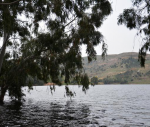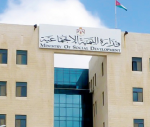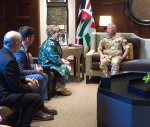You are here
EU expert calls for galvanising Jordan's multi-ethnic identity to enrich culture
By Dana Al Emam - May 26,2016 - Last updated at May 26,2016
AMMAN — The diverse cultural input of sub-groups that sought refuge in the Kingdom over the past few years should be mobilised to enrich Jordan's culture and contribute to the development process, according to a cultural expert.
"The point is to look at these various groups as an opportunity, not as a weakness," said Christiane Dabdoub Nasser, team leader of EU Med Culture project, adding that Jordan has been multi-ethnic for a long time and historically has always been an open society for newcomers.
Carried out in a number of countries in the region including Jordan, the four-year EU project, which started in 2014, seeks to improve policies and practices related to the culture sector through partnerships with local stakeholders.
The first year of the project was focused on consultations with local authorities and civil society organisations, as culture is a "very context-specific" issue, Dabdoub Nasser said, adding that moving forward in this field must be based on dialogue among partners.
The second year of the project examined the results of the consultations to identify the needs of each state in order to design country-specific programmes that would enhance cultural development once implemented.
"Stakeholders across Jordan highlighted a lack of a strategy... to steer the course of cultural development. This was defined as a priority need for Jordan," Dabdoub Nasser told The Jordan Times in an interview on the sidelines of a workshop held last week in Amman to identify the vision and major components of the national strategy.
In order for the strategy to become a reality, it must be supported by policies and objectives that serve the overall aim and provide means for implementing the goals, she added.
"The strategy functions as a cultural operator that works under a clear vision for the cultural sector in Jordan and introduces accountability to the process through periodic evaluations of progress," she said.
Dabdoub Nasser explained that one of Jordan's strengths is its excellence in creative industries, as well as the advanced performance of Jordanians in ICT.
Many Jordanian companies provide services for countries in the region and beyond, and such companies often complain that university graduates do not have the skills needed in the market, she said.
The strategy, in this case, looks at the higher education sector and offers ways to hone the skills of students in design and IT to enhance their competiveness in the creative industry market.
The concerned civil society organisations that participated in the consultations reiterated the need to improve art education in school, so that children can learn to respect culture, artistic values and aesthetics, the expert said.
Yet, one of the main shortcomings is the weakness of cultural institutions themselves.
"Like all other countries in the region, there is a need for capacity development even among civil society operators to enhance their competitiveness… culture is still elitist and we need to make it more inclusive," Dabdoub Nasser noted.
Furthermore, many people see culture through the lens of religion, a matter that necessitates using universal tools and adapting them into the Jordanian context for a richer and more comprehensive understanding of culture, she explained.
Based on the discussions and the consultations of the project, stakeholders agreed on the need for further government support, mainly through the Ministry of Culture.
In addition, they want culture to become a development tool and to be considered more seriously as a venue for socioeconomic development.
Another workshop will be held after six months where all stakeholders agree on a scheme to set up the strategy based on the previous consultations.
Related Articles
AMMAN — Developing and implementing Jordan’s first National Strategy for Culture will enhance the engagement of the younger generation and e
AMMAN — The Inclusion and Social Issues Project, a community-led initiative which emphasises the inclusion of refugees, will hold its last s
AMMAN — A group of Jordanians concerned with the challenges and uncertainties faced by the cultural sector are joining forces to strengthen














